Management Essay: Leadership Themes, Competencies, and Assumptions
VerifiedAdded on 2022/11/16
|7
|1994
|322
Essay
AI Summary
This essay delves into the evolving concept of leadership, emphasizing its critical role in contemporary organizations. It examines key leadership themes, including managing people, fostering a high-performance environment, promoting creativity and innovation, driving performance improvement, and managing change. The essay highlights the importance of employee motivation, customization, and problem-solving capabilities for organizational success. It also discusses the significance of global leadership competencies, such as interpersonal skills, efficiency, emotional intelligence, and visionary leadership. The paper analyzes relevant literature to support the claims and concludes by reiterating the increasing responsibilities of modern leaders in ensuring quality, productivity, and sustainable business operations. The essay also presents assumptions related to leadership competencies of the employees and the importance of these competencies for the effective management of the business operations inside the organizations.
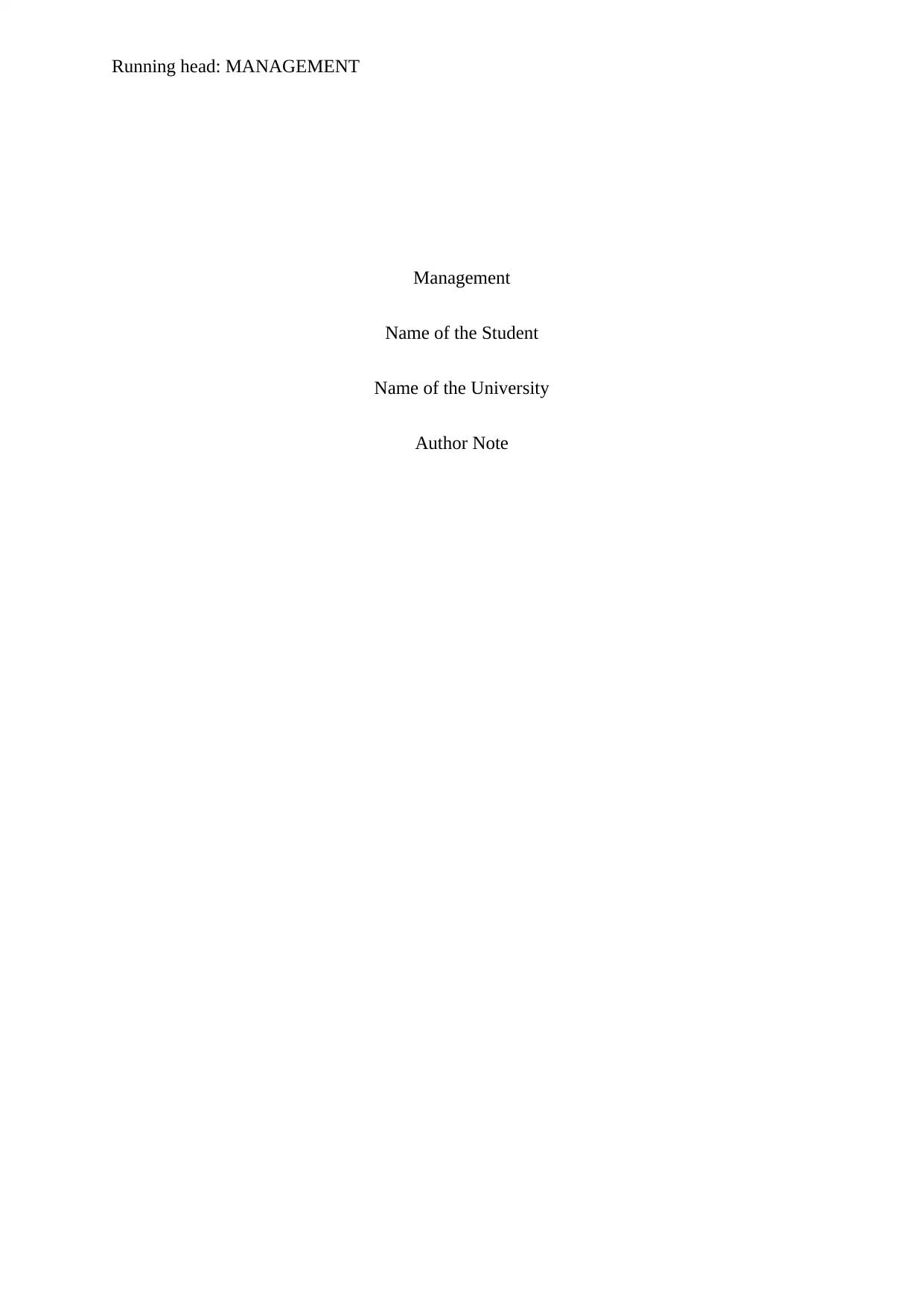
Running head: MANAGEMENT
Management
Name of the Student
Name of the University
Author Note
Management
Name of the Student
Name of the University
Author Note
Paraphrase This Document
Need a fresh take? Get an instant paraphrase of this document with our AI Paraphraser
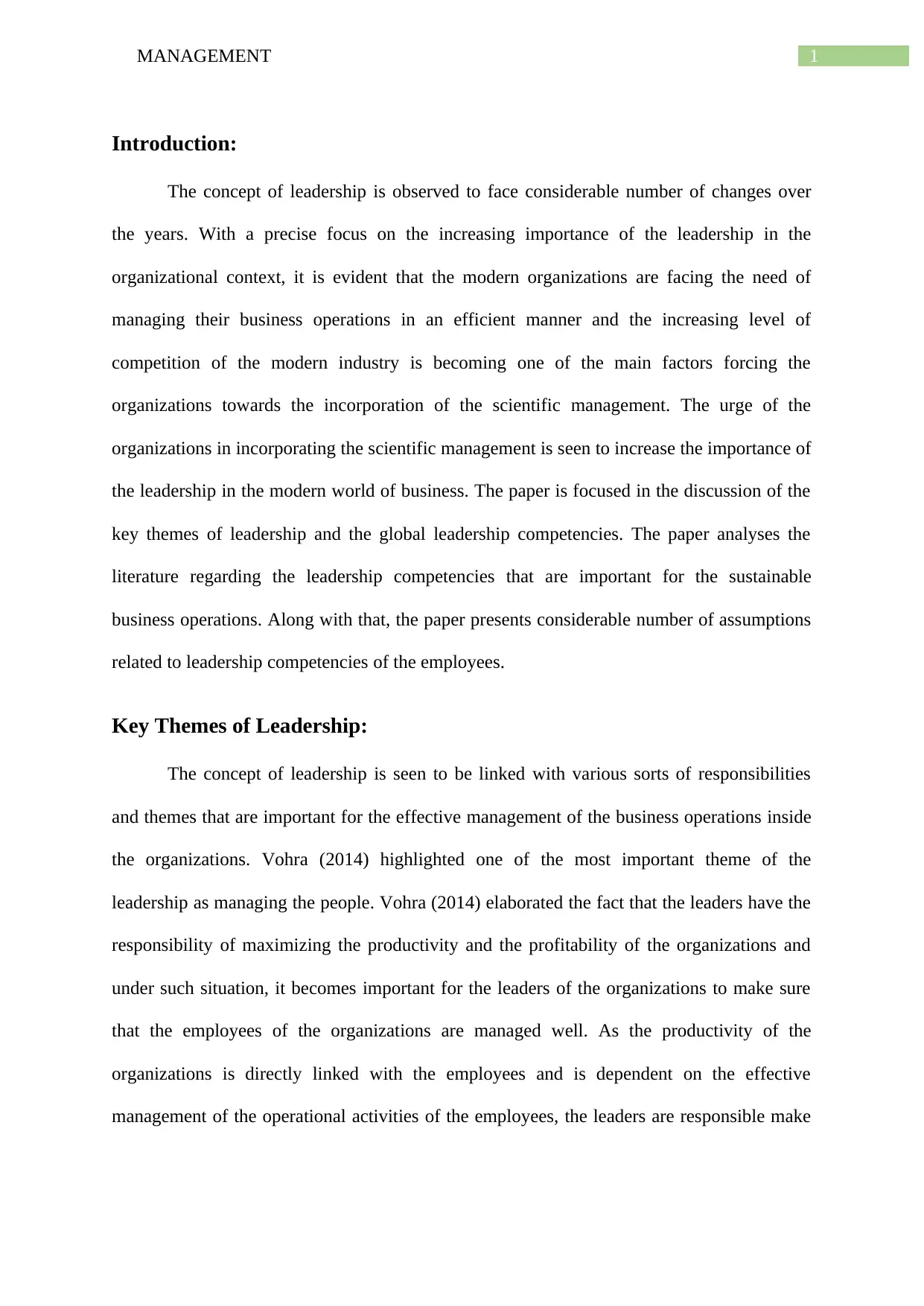
1MANAGEMENT
Introduction:
The concept of leadership is observed to face considerable number of changes over
the years. With a precise focus on the increasing importance of the leadership in the
organizational context, it is evident that the modern organizations are facing the need of
managing their business operations in an efficient manner and the increasing level of
competition of the modern industry is becoming one of the main factors forcing the
organizations towards the incorporation of the scientific management. The urge of the
organizations in incorporating the scientific management is seen to increase the importance of
the leadership in the modern world of business. The paper is focused in the discussion of the
key themes of leadership and the global leadership competencies. The paper analyses the
literature regarding the leadership competencies that are important for the sustainable
business operations. Along with that, the paper presents considerable number of assumptions
related to leadership competencies of the employees.
Key Themes of Leadership:
The concept of leadership is seen to be linked with various sorts of responsibilities
and themes that are important for the effective management of the business operations inside
the organizations. Vohra (2014) highlighted one of the most important theme of the
leadership as managing the people. Vohra (2014) elaborated the fact that the leaders have the
responsibility of maximizing the productivity and the profitability of the organizations and
under such situation, it becomes important for the leaders of the organizations to make sure
that the employees of the organizations are managed well. As the productivity of the
organizations is directly linked with the employees and is dependent on the effective
management of the operational activities of the employees, the leaders are responsible make
Introduction:
The concept of leadership is observed to face considerable number of changes over
the years. With a precise focus on the increasing importance of the leadership in the
organizational context, it is evident that the modern organizations are facing the need of
managing their business operations in an efficient manner and the increasing level of
competition of the modern industry is becoming one of the main factors forcing the
organizations towards the incorporation of the scientific management. The urge of the
organizations in incorporating the scientific management is seen to increase the importance of
the leadership in the modern world of business. The paper is focused in the discussion of the
key themes of leadership and the global leadership competencies. The paper analyses the
literature regarding the leadership competencies that are important for the sustainable
business operations. Along with that, the paper presents considerable number of assumptions
related to leadership competencies of the employees.
Key Themes of Leadership:
The concept of leadership is seen to be linked with various sorts of responsibilities
and themes that are important for the effective management of the business operations inside
the organizations. Vohra (2014) highlighted one of the most important theme of the
leadership as managing the people. Vohra (2014) elaborated the fact that the leaders have the
responsibility of maximizing the productivity and the profitability of the organizations and
under such situation, it becomes important for the leaders of the organizations to make sure
that the employees of the organizations are managed well. As the productivity of the
organizations is directly linked with the employees and is dependent on the effective
management of the operational activities of the employees, the leaders are responsible make
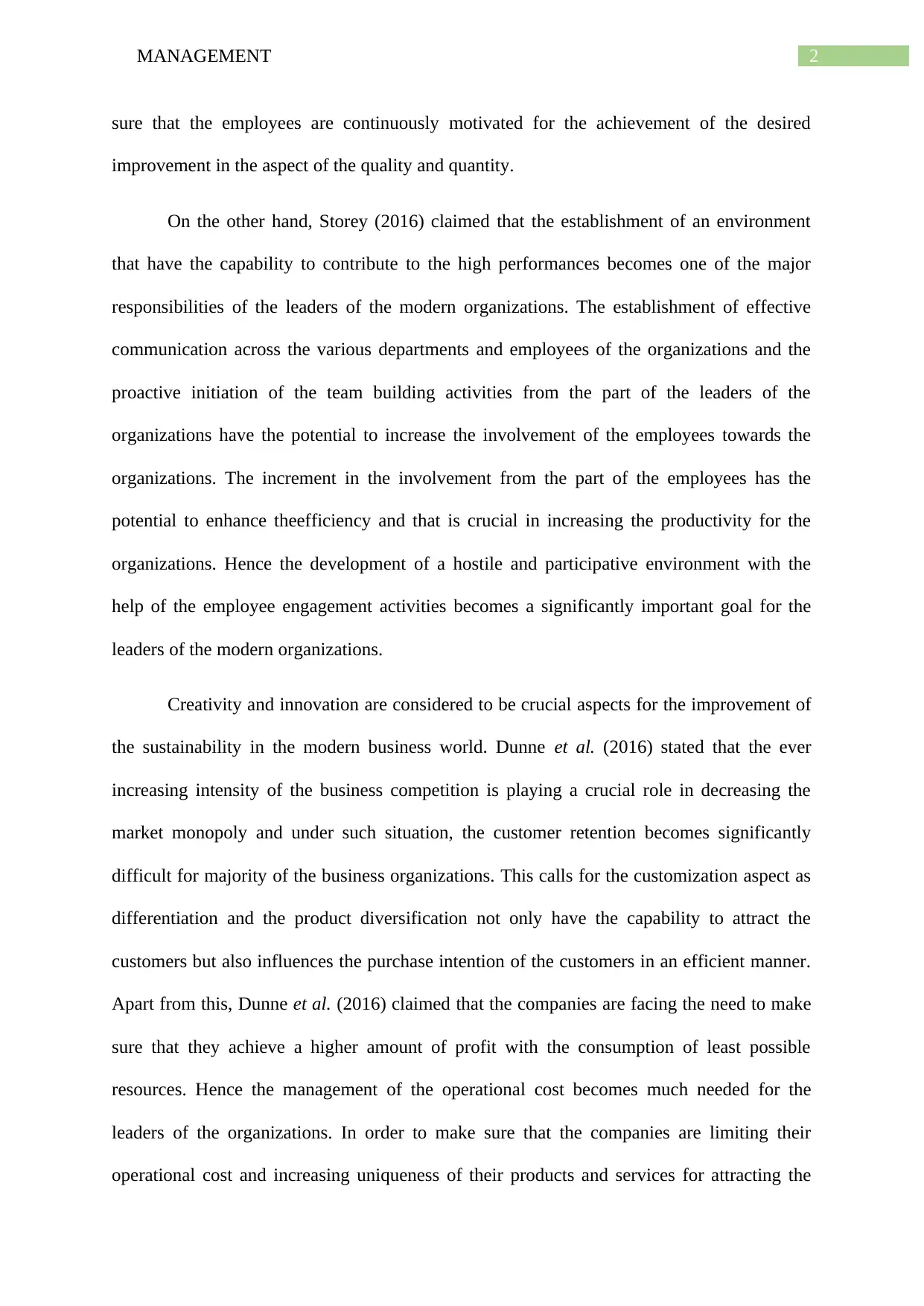
2MANAGEMENT
sure that the employees are continuously motivated for the achievement of the desired
improvement in the aspect of the quality and quantity.
On the other hand, Storey (2016) claimed that the establishment of an environment
that have the capability to contribute to the high performances becomes one of the major
responsibilities of the leaders of the modern organizations. The establishment of effective
communication across the various departments and employees of the organizations and the
proactive initiation of the team building activities from the part of the leaders of the
organizations have the potential to increase the involvement of the employees towards the
organizations. The increment in the involvement from the part of the employees has the
potential to enhance theefficiency and that is crucial in increasing the productivity for the
organizations. Hence the development of a hostile and participative environment with the
help of the employee engagement activities becomes a significantly important goal for the
leaders of the modern organizations.
Creativity and innovation are considered to be crucial aspects for the improvement of
the sustainability in the modern business world. Dunne et al. (2016) stated that the ever
increasing intensity of the business competition is playing a crucial role in decreasing the
market monopoly and under such situation, the customer retention becomes significantly
difficult for majority of the business organizations. This calls for the customization aspect as
differentiation and the product diversification not only have the capability to attract the
customers but also influences the purchase intention of the customers in an efficient manner.
Apart from this, Dunne et al. (2016) claimed that the companies are facing the need to make
sure that they achieve a higher amount of profit with the consumption of least possible
resources. Hence the management of the operational cost becomes much needed for the
leaders of the organizations. In order to make sure that the companies are limiting their
operational cost and increasing uniqueness of their products and services for attracting the
sure that the employees are continuously motivated for the achievement of the desired
improvement in the aspect of the quality and quantity.
On the other hand, Storey (2016) claimed that the establishment of an environment
that have the capability to contribute to the high performances becomes one of the major
responsibilities of the leaders of the modern organizations. The establishment of effective
communication across the various departments and employees of the organizations and the
proactive initiation of the team building activities from the part of the leaders of the
organizations have the potential to increase the involvement of the employees towards the
organizations. The increment in the involvement from the part of the employees has the
potential to enhance theefficiency and that is crucial in increasing the productivity for the
organizations. Hence the development of a hostile and participative environment with the
help of the employee engagement activities becomes a significantly important goal for the
leaders of the modern organizations.
Creativity and innovation are considered to be crucial aspects for the improvement of
the sustainability in the modern business world. Dunne et al. (2016) stated that the ever
increasing intensity of the business competition is playing a crucial role in decreasing the
market monopoly and under such situation, the customer retention becomes significantly
difficult for majority of the business organizations. This calls for the customization aspect as
differentiation and the product diversification not only have the capability to attract the
customers but also influences the purchase intention of the customers in an efficient manner.
Apart from this, Dunne et al. (2016) claimed that the companies are facing the need to make
sure that they achieve a higher amount of profit with the consumption of least possible
resources. Hence the management of the operational cost becomes much needed for the
leaders of the organizations. In order to make sure that the companies are limiting their
operational cost and increasing uniqueness of their products and services for attracting the
⊘ This is a preview!⊘
Do you want full access?
Subscribe today to unlock all pages.

Trusted by 1+ million students worldwide
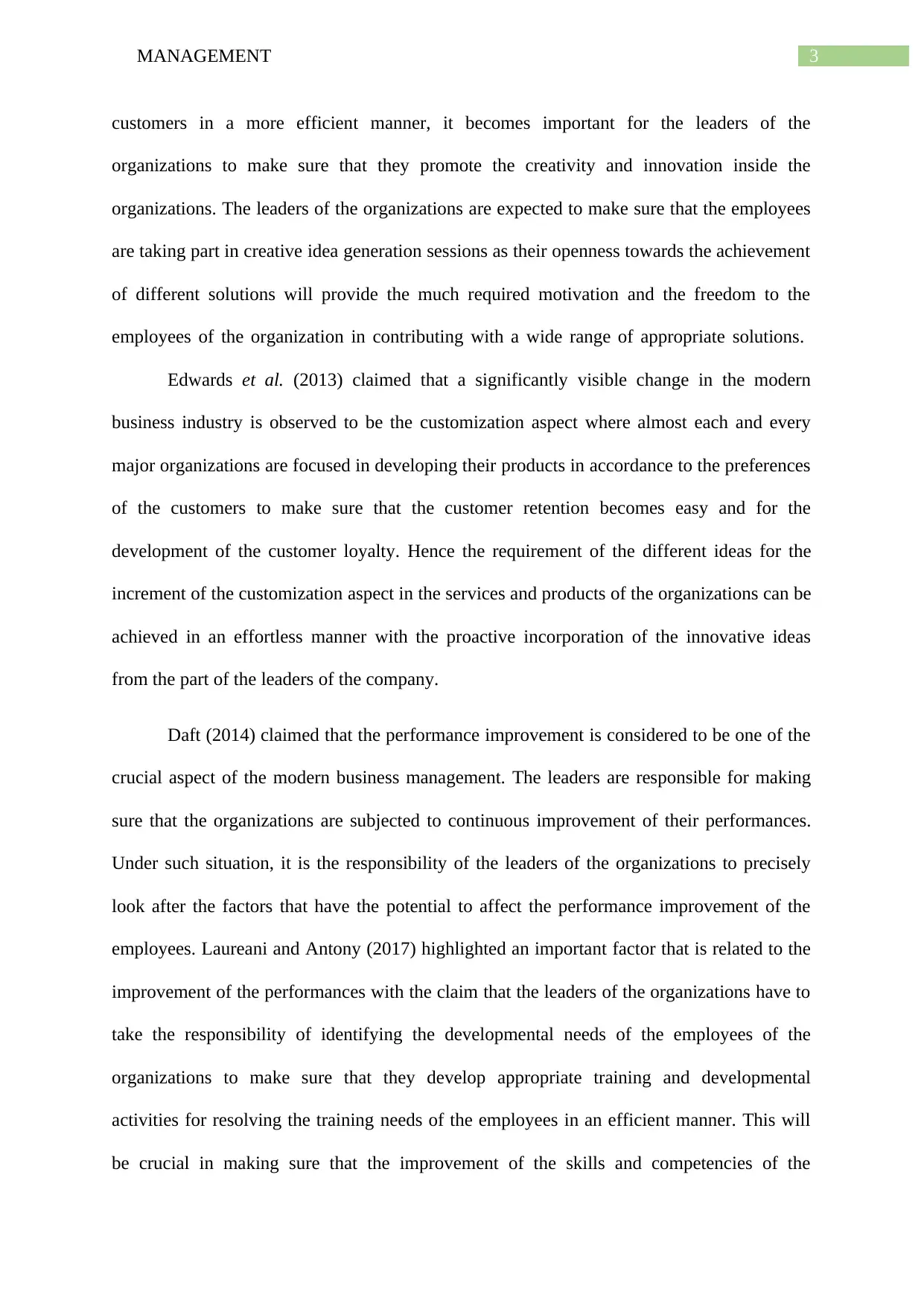
3MANAGEMENT
customers in a more efficient manner, it becomes important for the leaders of the
organizations to make sure that they promote the creativity and innovation inside the
organizations. The leaders of the organizations are expected to make sure that the employees
are taking part in creative idea generation sessions as their openness towards the achievement
of different solutions will provide the much required motivation and the freedom to the
employees of the organization in contributing with a wide range of appropriate solutions.
Edwards et al. (2013) claimed that a significantly visible change in the modern
business industry is observed to be the customization aspect where almost each and every
major organizations are focused in developing their products in accordance to the preferences
of the customers to make sure that the customer retention becomes easy and for the
development of the customer loyalty. Hence the requirement of the different ideas for the
increment of the customization aspect in the services and products of the organizations can be
achieved in an effortless manner with the proactive incorporation of the innovative ideas
from the part of the leaders of the company.
Daft (2014) claimed that the performance improvement is considered to be one of the
crucial aspect of the modern business management. The leaders are responsible for making
sure that the organizations are subjected to continuous improvement of their performances.
Under such situation, it is the responsibility of the leaders of the organizations to precisely
look after the factors that have the potential to affect the performance improvement of the
employees. Laureani and Antony (2017) highlighted an important factor that is related to the
improvement of the performances with the claim that the leaders of the organizations have to
take the responsibility of identifying the developmental needs of the employees of the
organizations to make sure that they develop appropriate training and developmental
activities for resolving the training needs of the employees in an efficient manner. This will
be crucial in making sure that the improvement of the skills and competencies of the
customers in a more efficient manner, it becomes important for the leaders of the
organizations to make sure that they promote the creativity and innovation inside the
organizations. The leaders of the organizations are expected to make sure that the employees
are taking part in creative idea generation sessions as their openness towards the achievement
of different solutions will provide the much required motivation and the freedom to the
employees of the organization in contributing with a wide range of appropriate solutions.
Edwards et al. (2013) claimed that a significantly visible change in the modern
business industry is observed to be the customization aspect where almost each and every
major organizations are focused in developing their products in accordance to the preferences
of the customers to make sure that the customer retention becomes easy and for the
development of the customer loyalty. Hence the requirement of the different ideas for the
increment of the customization aspect in the services and products of the organizations can be
achieved in an effortless manner with the proactive incorporation of the innovative ideas
from the part of the leaders of the company.
Daft (2014) claimed that the performance improvement is considered to be one of the
crucial aspect of the modern business management. The leaders are responsible for making
sure that the organizations are subjected to continuous improvement of their performances.
Under such situation, it is the responsibility of the leaders of the organizations to precisely
look after the factors that have the potential to affect the performance improvement of the
employees. Laureani and Antony (2017) highlighted an important factor that is related to the
improvement of the performances with the claim that the leaders of the organizations have to
take the responsibility of identifying the developmental needs of the employees of the
organizations to make sure that they develop appropriate training and developmental
activities for resolving the training needs of the employees in an efficient manner. This will
be crucial in making sure that the improvement of the skills and competencies of the
Paraphrase This Document
Need a fresh take? Get an instant paraphrase of this document with our AI Paraphraser
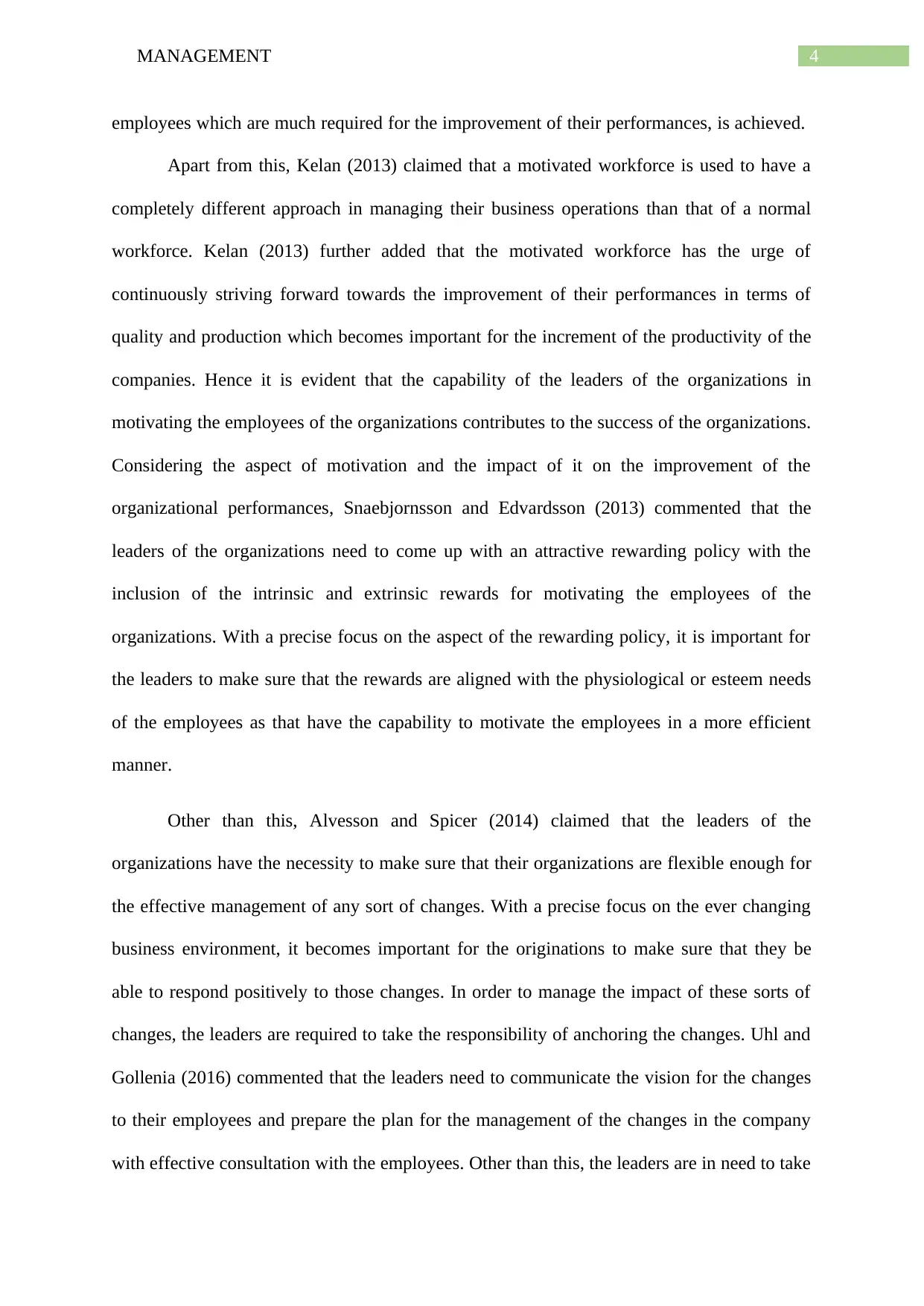
4MANAGEMENT
employees which are much required for the improvement of their performances, is achieved.
Apart from this, Kelan (2013) claimed that a motivated workforce is used to have a
completely different approach in managing their business operations than that of a normal
workforce. Kelan (2013) further added that the motivated workforce has the urge of
continuously striving forward towards the improvement of their performances in terms of
quality and production which becomes important for the increment of the productivity of the
companies. Hence it is evident that the capability of the leaders of the organizations in
motivating the employees of the organizations contributes to the success of the organizations.
Considering the aspect of motivation and the impact of it on the improvement of the
organizational performances, Snaebjornsson and Edvardsson (2013) commented that the
leaders of the organizations need to come up with an attractive rewarding policy with the
inclusion of the intrinsic and extrinsic rewards for motivating the employees of the
organizations. With a precise focus on the aspect of the rewarding policy, it is important for
the leaders to make sure that the rewards are aligned with the physiological or esteem needs
of the employees as that have the capability to motivate the employees in a more efficient
manner.
Other than this, Alvesson and Spicer (2014) claimed that the leaders of the
organizations have the necessity to make sure that their organizations are flexible enough for
the effective management of any sort of changes. With a precise focus on the ever changing
business environment, it becomes important for the originations to make sure that they be
able to respond positively to those changes. In order to manage the impact of these sorts of
changes, the leaders are required to take the responsibility of anchoring the changes. Uhl and
Gollenia (2016) commented that the leaders need to communicate the vision for the changes
to their employees and prepare the plan for the management of the changes in the company
with effective consultation with the employees. Other than this, the leaders are in need to take
employees which are much required for the improvement of their performances, is achieved.
Apart from this, Kelan (2013) claimed that a motivated workforce is used to have a
completely different approach in managing their business operations than that of a normal
workforce. Kelan (2013) further added that the motivated workforce has the urge of
continuously striving forward towards the improvement of their performances in terms of
quality and production which becomes important for the increment of the productivity of the
companies. Hence it is evident that the capability of the leaders of the organizations in
motivating the employees of the organizations contributes to the success of the organizations.
Considering the aspect of motivation and the impact of it on the improvement of the
organizational performances, Snaebjornsson and Edvardsson (2013) commented that the
leaders of the organizations need to come up with an attractive rewarding policy with the
inclusion of the intrinsic and extrinsic rewards for motivating the employees of the
organizations. With a precise focus on the aspect of the rewarding policy, it is important for
the leaders to make sure that the rewards are aligned with the physiological or esteem needs
of the employees as that have the capability to motivate the employees in a more efficient
manner.
Other than this, Alvesson and Spicer (2014) claimed that the leaders of the
organizations have the necessity to make sure that their organizations are flexible enough for
the effective management of any sort of changes. With a precise focus on the ever changing
business environment, it becomes important for the originations to make sure that they be
able to respond positively to those changes. In order to manage the impact of these sorts of
changes, the leaders are required to take the responsibility of anchoring the changes. Uhl and
Gollenia (2016) commented that the leaders need to communicate the vision for the changes
to their employees and prepare the plan for the management of the changes in the company
with effective consultation with the employees. Other than this, the leaders are in need to take
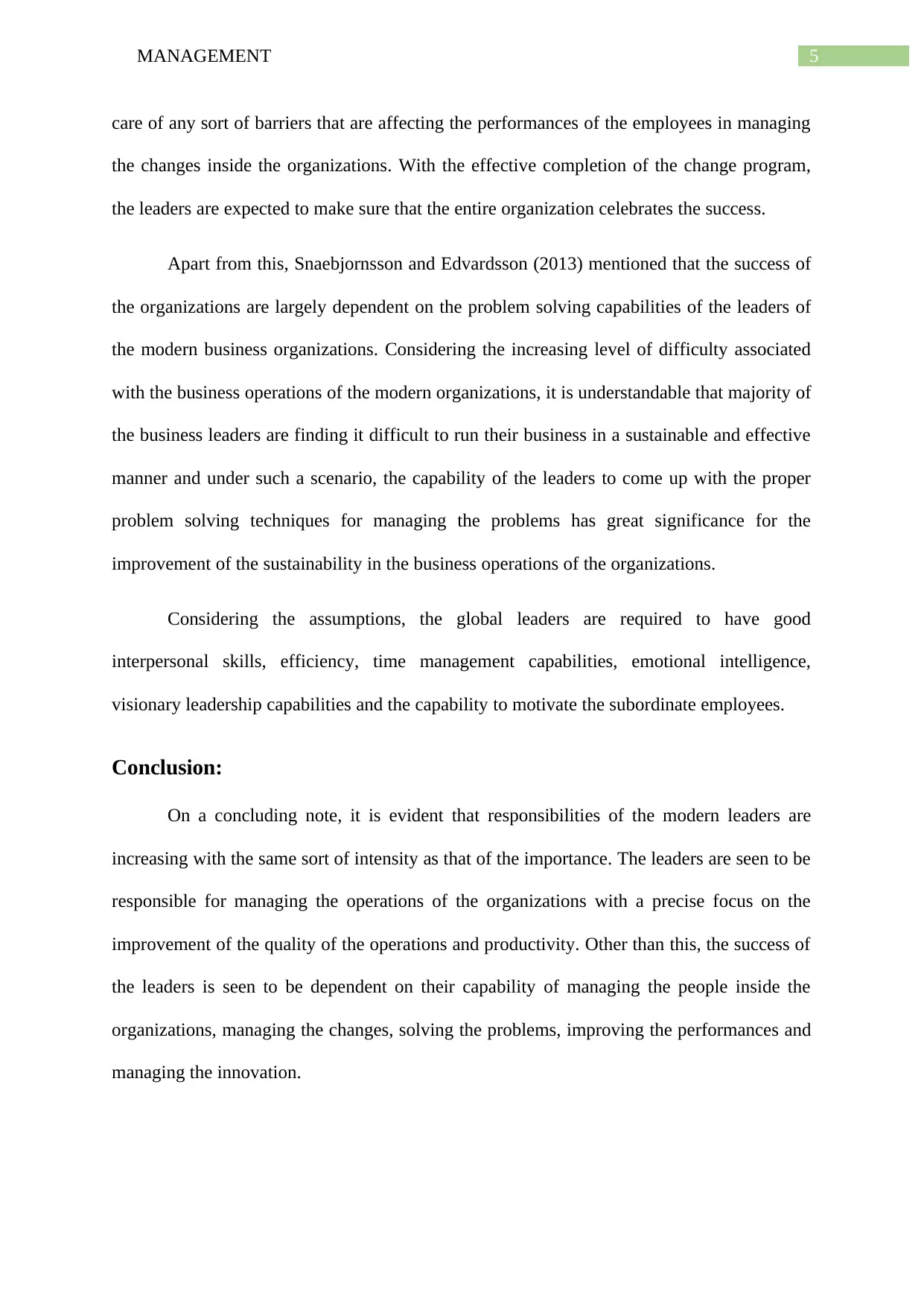
5MANAGEMENT
care of any sort of barriers that are affecting the performances of the employees in managing
the changes inside the organizations. With the effective completion of the change program,
the leaders are expected to make sure that the entire organization celebrates the success.
Apart from this, Snaebjornsson and Edvardsson (2013) mentioned that the success of
the organizations are largely dependent on the problem solving capabilities of the leaders of
the modern business organizations. Considering the increasing level of difficulty associated
with the business operations of the modern organizations, it is understandable that majority of
the business leaders are finding it difficult to run their business in a sustainable and effective
manner and under such a scenario, the capability of the leaders to come up with the proper
problem solving techniques for managing the problems has great significance for the
improvement of the sustainability in the business operations of the organizations.
Considering the assumptions, the global leaders are required to have good
interpersonal skills, efficiency, time management capabilities, emotional intelligence,
visionary leadership capabilities and the capability to motivate the subordinate employees.
Conclusion:
On a concluding note, it is evident that responsibilities of the modern leaders are
increasing with the same sort of intensity as that of the importance. The leaders are seen to be
responsible for managing the operations of the organizations with a precise focus on the
improvement of the quality of the operations and productivity. Other than this, the success of
the leaders is seen to be dependent on their capability of managing the people inside the
organizations, managing the changes, solving the problems, improving the performances and
managing the innovation.
care of any sort of barriers that are affecting the performances of the employees in managing
the changes inside the organizations. With the effective completion of the change program,
the leaders are expected to make sure that the entire organization celebrates the success.
Apart from this, Snaebjornsson and Edvardsson (2013) mentioned that the success of
the organizations are largely dependent on the problem solving capabilities of the leaders of
the modern business organizations. Considering the increasing level of difficulty associated
with the business operations of the modern organizations, it is understandable that majority of
the business leaders are finding it difficult to run their business in a sustainable and effective
manner and under such a scenario, the capability of the leaders to come up with the proper
problem solving techniques for managing the problems has great significance for the
improvement of the sustainability in the business operations of the organizations.
Considering the assumptions, the global leaders are required to have good
interpersonal skills, efficiency, time management capabilities, emotional intelligence,
visionary leadership capabilities and the capability to motivate the subordinate employees.
Conclusion:
On a concluding note, it is evident that responsibilities of the modern leaders are
increasing with the same sort of intensity as that of the importance. The leaders are seen to be
responsible for managing the operations of the organizations with a precise focus on the
improvement of the quality of the operations and productivity. Other than this, the success of
the leaders is seen to be dependent on their capability of managing the people inside the
organizations, managing the changes, solving the problems, improving the performances and
managing the innovation.
⊘ This is a preview!⊘
Do you want full access?
Subscribe today to unlock all pages.

Trusted by 1+ million students worldwide
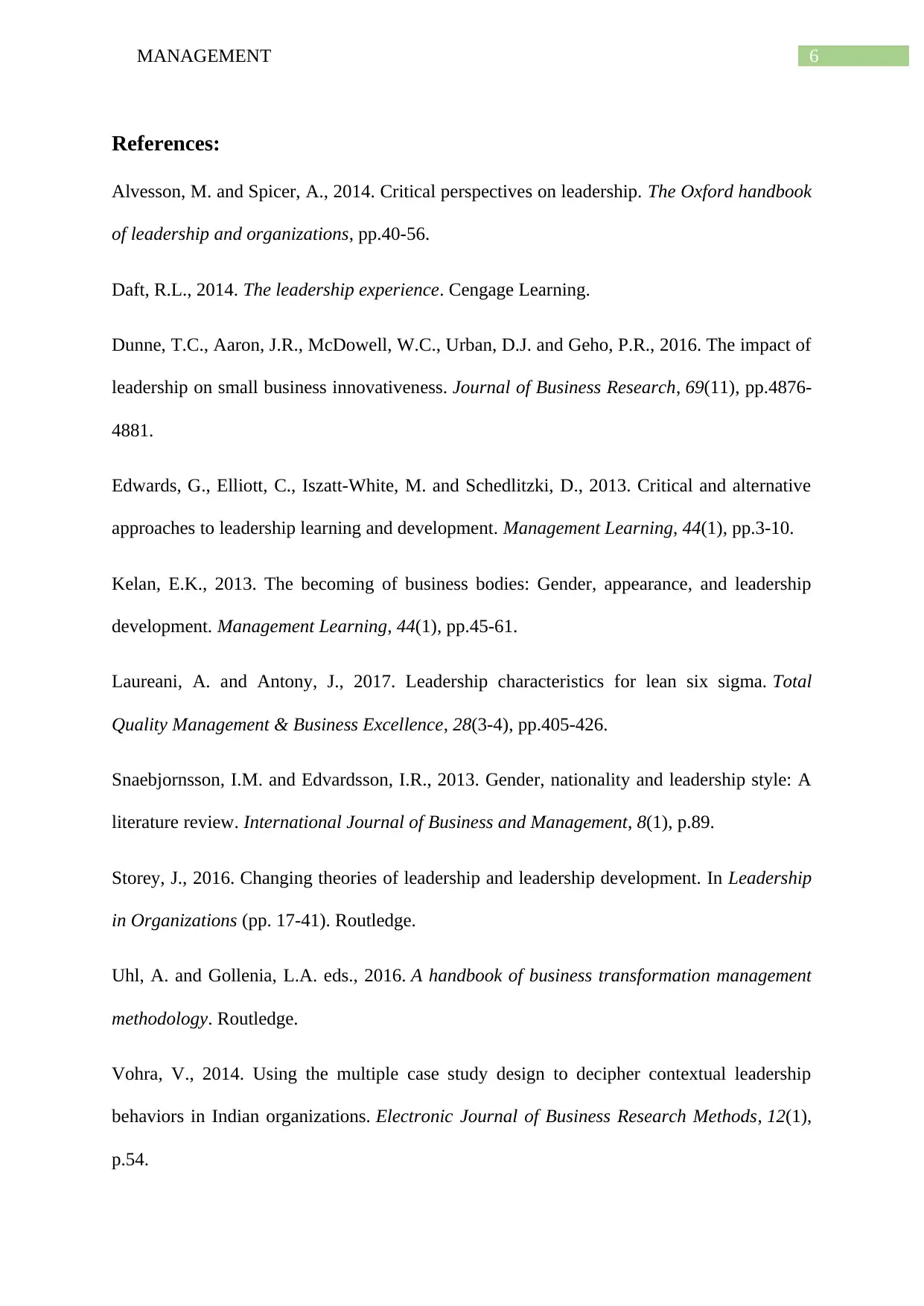
6MANAGEMENT
References:
Alvesson, M. and Spicer, A., 2014. Critical perspectives on leadership. The Oxford handbook
of leadership and organizations, pp.40-56.
Daft, R.L., 2014. The leadership experience. Cengage Learning.
Dunne, T.C., Aaron, J.R., McDowell, W.C., Urban, D.J. and Geho, P.R., 2016. The impact of
leadership on small business innovativeness. Journal of Business Research, 69(11), pp.4876-
4881.
Edwards, G., Elliott, C., Iszatt-White, M. and Schedlitzki, D., 2013. Critical and alternative
approaches to leadership learning and development. Management Learning, 44(1), pp.3-10.
Kelan, E.K., 2013. The becoming of business bodies: Gender, appearance, and leadership
development. Management Learning, 44(1), pp.45-61.
Laureani, A. and Antony, J., 2017. Leadership characteristics for lean six sigma. Total
Quality Management & Business Excellence, 28(3-4), pp.405-426.
Snaebjornsson, I.M. and Edvardsson, I.R., 2013. Gender, nationality and leadership style: A
literature review. International Journal of Business and Management, 8(1), p.89.
Storey, J., 2016. Changing theories of leadership and leadership development. In Leadership
in Organizations (pp. 17-41). Routledge.
Uhl, A. and Gollenia, L.A. eds., 2016. A handbook of business transformation management
methodology. Routledge.
Vohra, V., 2014. Using the multiple case study design to decipher contextual leadership
behaviors in Indian organizations. Electronic Journal of Business Research Methods, 12(1),
p.54.
References:
Alvesson, M. and Spicer, A., 2014. Critical perspectives on leadership. The Oxford handbook
of leadership and organizations, pp.40-56.
Daft, R.L., 2014. The leadership experience. Cengage Learning.
Dunne, T.C., Aaron, J.R., McDowell, W.C., Urban, D.J. and Geho, P.R., 2016. The impact of
leadership on small business innovativeness. Journal of Business Research, 69(11), pp.4876-
4881.
Edwards, G., Elliott, C., Iszatt-White, M. and Schedlitzki, D., 2013. Critical and alternative
approaches to leadership learning and development. Management Learning, 44(1), pp.3-10.
Kelan, E.K., 2013. The becoming of business bodies: Gender, appearance, and leadership
development. Management Learning, 44(1), pp.45-61.
Laureani, A. and Antony, J., 2017. Leadership characteristics for lean six sigma. Total
Quality Management & Business Excellence, 28(3-4), pp.405-426.
Snaebjornsson, I.M. and Edvardsson, I.R., 2013. Gender, nationality and leadership style: A
literature review. International Journal of Business and Management, 8(1), p.89.
Storey, J., 2016. Changing theories of leadership and leadership development. In Leadership
in Organizations (pp. 17-41). Routledge.
Uhl, A. and Gollenia, L.A. eds., 2016. A handbook of business transformation management
methodology. Routledge.
Vohra, V., 2014. Using the multiple case study design to decipher contextual leadership
behaviors in Indian organizations. Electronic Journal of Business Research Methods, 12(1),
p.54.
1 out of 7
Related Documents
Your All-in-One AI-Powered Toolkit for Academic Success.
+13062052269
info@desklib.com
Available 24*7 on WhatsApp / Email
![[object Object]](/_next/static/media/star-bottom.7253800d.svg)
Unlock your academic potential
Copyright © 2020–2026 A2Z Services. All Rights Reserved. Developed and managed by ZUCOL.





